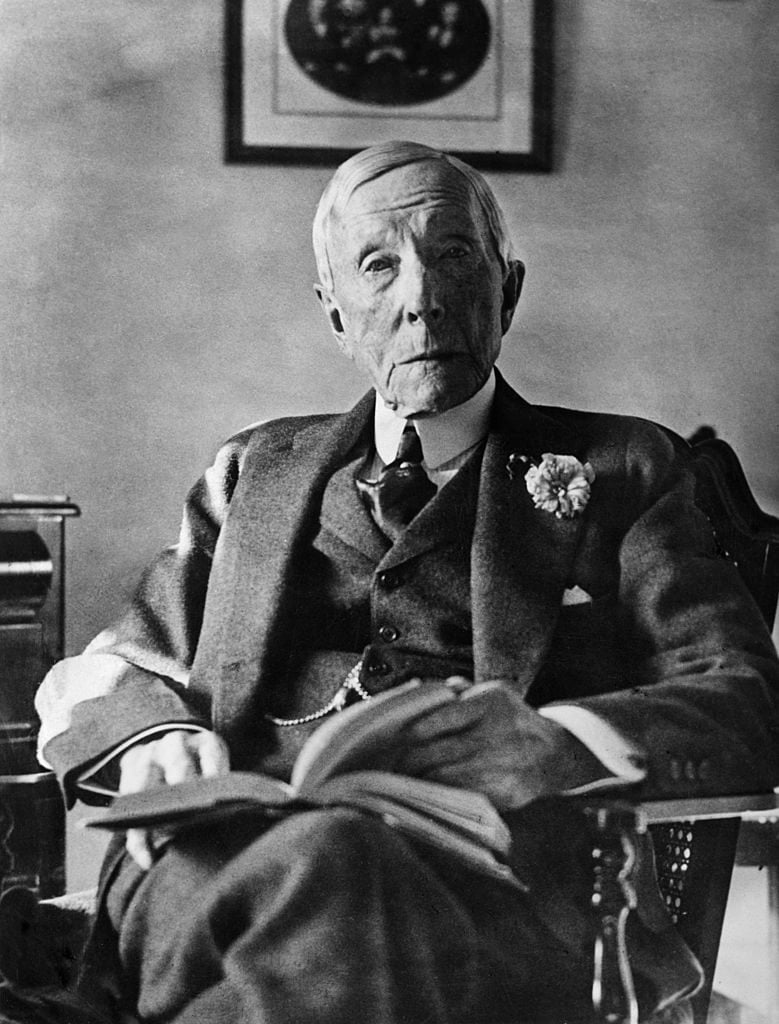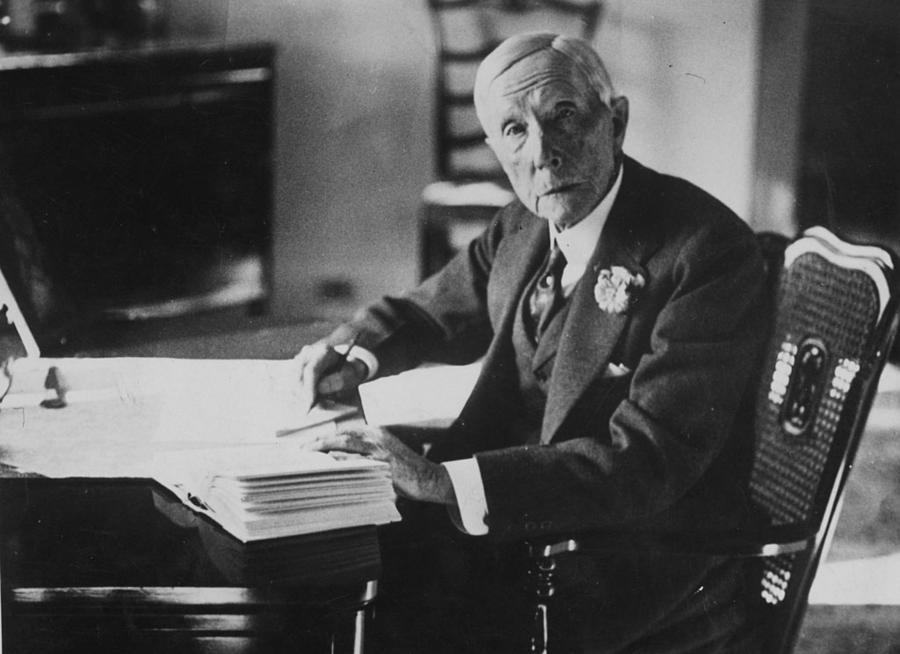If you take the five richest people in the world and add up their fortunes, you still would be about $13.5 billion short of the net worth of the richest person in modern history: John Davison Rockefeller. Adjusted for inflation, the Standard Oil Company founder's personal fortune would be worth an astounding $350 billion in today's dollars. But you may be surprised to learn that in addition to his ungodly success in the oil industry, Rockefeller was also a pioneering philanthropist. Both in his lifetime and after death, Rockefeller used his money to help establish and grow universities, eradicate entire diseases, further medical research, and offer educational opportunities to African Americans during the height of the Jim Crow South. He was the first person in history to reach a personal net worth of $1 billion, and his fortune at one point accounted for 1.53 percent of the entire U.S. economy. What's even more amazing is the fact that Rockefeller began his ascent to the highest levels of capitalism at the very bottom of the food chain. This is his story.

John D. Rockefeller – Life Story / General Photographic Agency/Getty Images
Born on July 8, 1839, in Richford, New York, to William Avery and Eliza Rockefeller, John Davison was the second of six children. His father, a traveling salesman and vagabond known to neighbors as "Devil Bill," abandoned his wife and children when John was a teenager. Before leaving, though, Bill had two other children with a live-in mistress and was frequently away from the family. John's mother was a devout Baptist who instilled thriftiness and discipline in her children. Young John's first venture into business came at the age of 7 or 8, when his mother provided him with some turkeys to care for and sell. From the start, John kept track of every penny spent and earned in a notebook. His mother encouraged him to work hard and to give a percentage of his earnings to the church and to the disadvantaged. By 14, he was lending money to neighbors at 7 percent interest, quickly learning that he could make more this way than through manual labor.
After a few moves around New York, the Rockefellers settled in a suburb of Cleveland, where John attended Central High School. He completed a short business course at a small nearby college and jumped into a career as a bookkeeper. Despite — or in spite of — his father's eccentric example, John was described as serious and discreet, with a penchant for numbers. He was also very active in a local church. When the church was threatened with closure due to unpaid debts, John solicited contributions every Sunday until he'd raised enough to keep the church open. At 16, he got a job as an assistant bookkeeper at a wholesale produce commission in Cleveland. After a year, he became the head bookkeeper, earning an annual salary of $500. The following year, he was offered $700, but turned it down to go into business for himself. From his very first paycheck, he tithed 10 percent of his earnings to his church.

General Photographic Agency/Getty Images
At 19, Rockefeller invested $2,000 to co-found Clark & Rockefeller, a commission business with a partner 10 years his senior. He borrowed a lot of money from local banks to finance the expansion of the business, but had the best credit in town because of his "normal" habits, his church attendance, and his ability to pay back his debts on time. While the company grew, Rockefeller lived frugally, saved money, and reinvested back in the business, which was turning a profit from day one. At the age of 23, his economic habits allowed him to jump at the chance to enter the oil business when the "black gold" was discovered in Pennsylvania. Along with his partner, he invested in a refinery planned by Clark Andrews. The company, Andrews, Clark & Co., didn't even bare Rockefeller's name. By 1865, the partnership dissolved and Rockefeller bought the refinery at auction for $72,500, which he'd mostly borrowed. He renamed the firm Rockefeller & Andrews. The following year, the firm bought another Cleveland refinery established by John's brother, William, and the company became Rockefeller, Andrews & Flagler, a precursor to what would become the Standard Oil Company. Before he'd even turned 30 years old, John D. Rockefeller had a controlling interest in what was already the largest oil refinery in the world. By 31, Rockefeller incorporated the Standard Oil Company for the sum of $1 million. He made himself president. A decade later, after numerous acquisitions and further growth, the Standard Oil Trust was created. It's capital was valued at $70 million.
But trouble struck towards the end of the 1870s. Standard Oil was refining more than 90 percent of the U.S.'s oil, peaking at 90 percent of oil refined in the world before dropping closer to 80 percent in the face of foreign refineries. As a result of its huge success, the company — and its president — became a target for journalists and politicians, who decried Rockefeller's monopoly on the market. In 1890, after the company had moved its headquarters to New York City, the Sherman Antitrust Act was passed. The law would be instrumental in breaking up the Standard Oil Trust. By this time, Rockefeller invested in iron ore and its transport, setting up a competition with fellow tycoon Andrew Carnegie. These interests would be sold to steel magnate J.P. Morgan, of U.S. Steel, in exchange for stock and for membership on the company's board of directors for Rockefeller and his son, John Jr. In 1911, the U.S. Supreme Court ruled that the Standard Oil Co. was in violation of the Sherman Antritrust Act, and the company was divided into 34 smaller organizations — some of which became Conoco, BP, Amoco, Chevron, and ExxonMobil. Rockefeller received proportionate shares of stock in each company, profiting handsomely in the aftermath. His personal fortune shot up to nearly $1 billion.
Decades earlier, throughout the 1890s, Rockefeller had been slowing down, focusing on leisure activities and retirement. He experienced health issues, including depression, digestive problems, and alopecia, which caused him to lose most of his hair. He began wearing wigs and started to withdraw from the day-to-day operations of his business. He bought a sprawling 3,400-acre estate in Westchester County, New York, in 1893. A mansion was built on the grounds 20 years later. The 40-room house has since served as a home for four generations of Rockefellers. The estate also includes a golf course, some 75 houses, a number of outbuildings, lush gardens, and 70 private roads (largely designed by Rockefeller and his son). Today, about 10 Rockefeller families live on the estate.Throughout his successful business career, Rockefeller had been very generous with his money. In 1884, he was the major funder for Spelman College (named after his wife's family), a university in Atlanta for African-American women. He was also instrumental in the creation of the University of Chicago. A devout Baptist, he often gave to Baptist causes, especially educating black youth in the South. His giving also included support to Yale, Harvard, Columbia, Brown, and other eastern schools. In 1901, he founded the Rockefeller Institute for Medical Research, which eventually became Rockefeller University. In 1909, he founded the Rockefeller Sanitary Commission, which went on to eradicate hookworm disease. In 1913, he created the Rockefeller Foundation with $250 million. It helped endow the Johns Hopkins School of Hygiene and Public Health, funded a medical school in China, and eventually took over the Sanitary Commission.
During his lifetime, John D. Rockefeller offered some wisdom for the business titans of the future. Here are a few, from his New York Times obituary:
- Do all the good you can.
- Do not grow old before your time. Maintain an interest in life and all living things.
- A little rest now and then helps a man to accomplish more.
- Do not be afraid to work.
- Persevere. If you make a mistake, remember that it is human to err. Try again and try harder.
- I believe it is a duty for a man to get all the money he honestly can and to give all he can.
- Live within your means. One of the swiftest toboggans I know of is for a young man just starting in life to get into debt.
- There is no feeling in this world to be compared with self-reliance — do not sacrifice that to anything else.
- A clear conscience is worth more and is a greater comfort than is a great fortune gathered by dishonorable methods.
- Sons of wealthy parents have not the ghost of a chance compared with boys who came from the country with the determination to do something in this world.
As a boy, Rockefeller had dreamed of earning $100,000 and living to be 100. As we mentioned previously, when adjusted for inflation, Rockefeller had accumulated a personal fortune worth $350 billion. . He clearly surpassed the first life goal, and was just barely shy of the second one. Rockefeller died on May 23, 1937, at the age of 97, from arteriosclerosis. After his death, the extent of Rockefeller's generosity was made public. Between 1855 and 1934, he'd given nearly $531 million (equal to $7 billion in modern dollars) to various philanthropic efforts, surpassing even the $350 million of fellow philanthropist and business titan Andrew Carnegie. His only son continued in his father's footsteps, also giving away more than $530 million during his own lifetime. His grandchildren and great-grandchildren, many involved in politics, have kept the Rockefeller name in the forefront of the American conscience — not that John D. needed much help.
/2015/07/rock.jpg)
/2015/08/GettyImages-475619134.jpg)
/2018/07/jeff.jpg)
/2014/03/richest.jpg)
/2021/03/Andrew-Carnegie.jpg)
/2017/03/David-Rockefeller.jpg)
/2010/10/GettyImages-468741788.jpg)
/2010/07/John-Elway.jpg)
/2020/04/Teddy-Bridgewater.jpg)
:strip_exif()/2020/06/taylor.png)
/2021/10/Tea-Leoni.jpg)
/2021/05/Ian-Ziering.jpg)
/2013/09/reggie.jpg)
/2014/11/Odell-Beckham-Jr.jpg)
/2022/08/mickey.jpg)
/2019/11/Jerry-Jones-1.jpg)
/2009/11/seal2.jpg)
/2010/11/Tyson-Beckford.jpg)
/2012/03/Joss-Whedon.jpg)
/2015/07/LeSean-McCoy-1.jpg)
/2021/08/Billy-Ocean.jpg)
/2010/03/chip2.jpg)
/2020/09/Jimmy-Johnson.jpg)